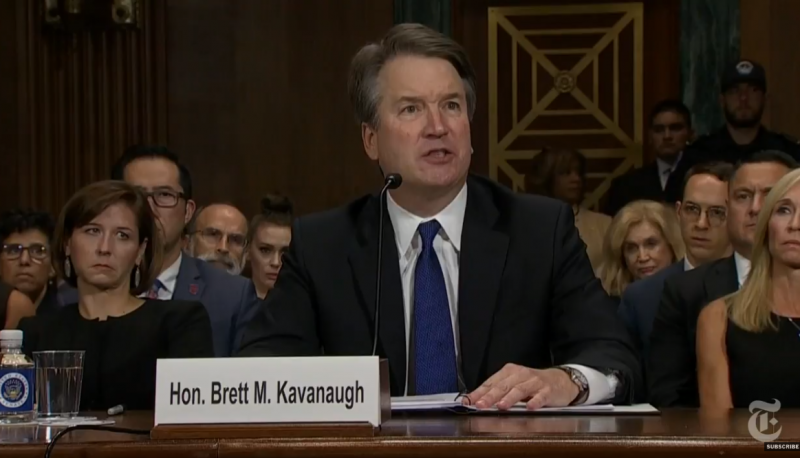As much as Brett Kavanaugh’s advocates have tried, with great bluster, to portray opposition to his nomination as a partisan power grab—or the work of Satan and his demons—the uncomfortable truth for Kavanaugh and the White House is that there is a growing body of Kavanaugh criticism from people and outlets that cannot remotely be characterized as part of some radical left-wing conspiracy.
At The American Conservative, for example, senior editor Daniel Larison writes:
When Kavanaugh was nominated, I became aware of some of his bad rulings on 4th Amendment and other issues, but I did not have reason to think he was unfit to serve. The last few weeks and Kavanaugh’s behavior during that time have led me to conclude that he should not be confirmed, and the main reason for that is that he has lied repeatedly under oath. Everyone that watched his testimony on Thursday was witness to it, and the evidence that he lied to the Judiciary Committee many times seems to me to be overwhelming. For the purposes of determining whether he should be a Supreme Court justice, it doesn’t really matter why he lied or what he lied about. The fact that he knowingly gave false statements under oath should disqualify him. …
Now Kavanaugh has committed the same crime of perjury, and the very least that the Senate can do is refuse to reward him for that crime by giving him a lifetime seat on the Supreme Court. If the Senate truly valued the rule of law, Kavanaugh’s nomination would never have made it out of committee. Unless it wants to make a mockery of both the Court and the rule of law, the Senate now has to defeat Kavanaugh’s nomination.
At America, a Jesuit magazine, the editors withdrew their previous endorsement of Kavanaugh’s nomination after the hearing in which he and Dr. Christine Blasey Ford testified. The nomination, they declared, “is no longer in the best interests of the country” and “should be withdrawn.”
The hearings and the committee’s deliberations are now also a bellwether of the way the country treats women when their reports of harassment, assault and abuse threaten to derail the careers of powerful men. …
If Senate Republicans proceed with his nomination, they will be prioritizing policy aims over a woman’s report of an assault. Were he to be confirmed without this allegation being firmly disproved, it would hang over his future decisions on the Supreme Court for decades and further divide the country.
America’s editorial is remarkable given that the editors explicitly endorse Kavanaugh’s “textualist” approach to the Constitution, but note that there are other judges who share it:
For the good of the country and the future credibility of the Supreme Court in a world that is finally learning to take reports of harassment, assault and abuse seriously, it is time to find a nominee whose confirmation will not repudiate that lesson.
At Forbes, senior contributor Steve Denning, a former World Bank director who writes about leadership and business management, argues that Kavanaugh “bombed his job interview” before the Senate Judiciary Committee. Denning called last Thursday’s hearing a “test of character” that Kavanaugh failed:
This witness was aggrieved and complaining about the situation. This witness was impolite and challenged the integrity of the questioners and portrayed the hearing in the starkest partisan terms. This witness made no apparent effort to bring a lifetime of professional expertise and perspective to bear on the difficult issues under consideration. Instead, this witness was dismissive of the inquiry and was careless on matters of fact that had been asserted by other potential witnesses on the subject under discussion. This witness made no apparent effort to hold emotions in check and shouted at U.S. Senators. This witness repeatedly sought to shift the attention and blame to others for what was taking place. This witness resisted further legal inquiry into the issues under discussion. This witness approached the inquiry with an attitude of entitlement and self-pity. This witness was remarkably unprofessional in manner—the very opposite of what one hopes for and expects in a professor or a judge. …
Not only did Judge Kavanaugh portray the issues under discussion in starkly partisan terms. The unjudicial anger and attitudes of entitlement that Judge Kavanagh had apparently been feeling all this while poured forth into the hearing.
The issue that now confronts the Senate Judiciary Committee and the Republican leadership is: what do we do, now that we have learned more about the true Judge Kavanaugh? If the Judge Kavanaugh that was on display at the hearing yesterday is the real thing, then he is clearly an inappropriate life-time appointee to the Supreme Court, which requires a non-partisan, reflective, and objective approach to the most difficult and sensitive political issues. Like many of the people who come in contact with President Trump, yesterday Judge Kavanaugh’s behavior had become classic Trumpian, which is at odds with the traditions, reputation and honor of the U.S. Supreme Court.
At this point, the question of fact as to exactly what happened 36 years ago between teenagers in a Bethesda bedroom is less relevant than what happened between mature adults in yesterday’s Senate hearing. This is no-longer a he-said/she-said issue. It is a question of character. Even if Dr. Ford were to be mistaken in her recollections of what happened 36 years ago, Judge Kavanaugh’s starkly partisan, unjudge-like behavior yesterday is real and current and needs to be assessed on its own merits. Yesterday’s hearing was an interview for a job, and Judge Kavanaugh failed the test.
If the Republican leadership proceeds with the appointment of Judge Kavanaugh to the Supreme Court in the face of this stark new evidence, they risk causing grave reputational damage both to their party and to the Supreme Court itself.
These critics join Rep. Justin Amash, a Tea Party Republican who sees Kavanaugh as “really bad” on the Fourth Amendment’s protections against unreasonable search as applied to government surveillance in the digital age—and as overly deferential to executive authority. “When Kavanaugh is on the Supreme Court, undermining our #4thAmendment right against unreasonable searches and seizures, it will be too late for others to join me,” Amash tweeted in July.








